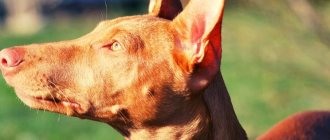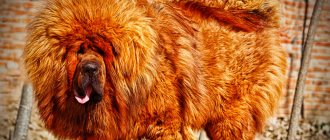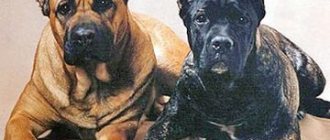The character of a dog depends on heredity and breed characteristics, but proper upbringing and training is also of no small importance. In this article we will tell you about the natural characteristics of the breed and how to properly start raising and training your pet.
The Dogue de Bordeaux is a powerful, strong guard and a reliable friend for the whole family. In the past the dog was used in dog fighting, nowadays it is an excellent companion dog.
- Country of origin : France
- Height at withers : male: 60–68 cm; female: 58-66 cm
- Weight : male: min. 50 kg; female: min. 45 kg
- Lifespan : 10-12 years
- Use : Companion Dog, Security
- Other names : French Mastiff
Content
- The main character traits of the Dogue de Bordeaux: female or male?
- Character of the Dogue de Bordeaux
- Basic commands
- Raising a dog
In this article you will learn what features of character and behavior are inherent in the Dogue de Bordeaux. After studying this information about the temperament and disposition of the Dogue de Bordeaux at different ages, get an idea about the breed. Find out how the character of a bitch differs from the behavior of a dog. We hope our article will help you figure out which gender of puppy is best for you.
The main character traits of the Dogue de Bordeaux: female or male?
The Dogue de Bordeaux puppy is an active and restless pet. If you take care of and train your puppy, you can avoid pampering. Constant damage to things does not indicate the baby’s bad character, he is just very active and needs somewhere to throw out his energy. You can buy toys for him, he will be active with them, direct his energy to playing with them. Already from 3-4 months (the time of socialization), he is able to perceive the general rules of education. At this time, it is important to begin socializing and training the dog.
Bitch: character
There is an opinion that Dogue de Bordeaux bitches have a more submissive and gentle character. But experts believe that character largely depends on heredity and individual characteristics. There are always exceptions, bitches with a very difficult character, and there are males with an easy-going and submissive character. But still, there is a difference in the behavior of the sexes. There are advantages and disadvantages for female and male genders.
Advantages:
- Strong relationship with owner and home
- Emotionally sensitive perception
- Girls are smarter and smarter than boys
- Accepts training tasks well
- During walks, he runs less in the bushes
- Doesn't rush at strangers
- The breed is ideal for breeding, just one assessment from the exhibition is enough
Flaws:
- Sly
- Periodic menstruation
Caring for Dogue de Bordeaux
If you are interested in this breed, please note that this dog is a slobber. You'll probably want to take the bib with you and move away if he shakes his head.
The Dogue de Bordeaux has a very short, soft coat that does not require much attention. To care for the coat, periodic use of a grooming mitt or glove should be sufficient. However, the numerous folds of skin on a dog's face require regular cleaning to avoid irritation and infection.
Due to its gigantic size, grooming should be started at an early age to get your dog used to it. Although her nails wear naturally, check them periodically and trim them as needed, only needing a bath a couple of times a year.
By nature, the Dogue de Bordeaux is a vigilant and fearless protector, but by no means aggressive. This giant dog breed does everything it can to protect its family, while being quite gentle and obedient (and sometimes even stupid).
However, a rigorous training program should be developed as soon as possible after purchasing a dog. Socialization is equally important. This is partly due to the enormous size of the breed. An untrained dog of this size can become completely uncontrollable.
This breed has a strong instinct to chase small animals such as cats. They also will not tolerate another dog in the house, especially one of the same gender. Although socialization and training can prevent problems, caution is necessary.
The Dogue de Bordeaux is moderately energetic for its size and needs to be properly exercised. Along with exercise, adequate exercise is very important: one long walk or several short walks every day.
However, don't overdo it! This large dog breed may be prone to orthopedic problems. Additionally, the dog is brachycephalic (short-nosed), which may overheat or pant. If a pet of this size gets very tired and cannot walk back, it is unlikely that you will be able to carry it home.
Male: character
Advantages:
- High performance, very durable
- Solid appearance, a big plus for exhibitions
- Persistence in achieving results in the learning process
Flaws:
- Independent and more stubborn than a girl. Requires more strict training than a girl.
- To fulfill your physical and natural needs, you need a longer time for walks. According to physiology, he is not capable of quickly emptying the bladder.
- Can run away from its owner if it smells a female in heat.
- During the period of estrus in females, fights with other males are possible.
Is it possible to influence and correct the character of the Dogue de Bordeaux?
Raising and training the Dogue de Bordeaux is of great importance, as soon as you bring him into your home. Do not allow people to chew things, stop attempts to pester strangers while walking, do not allow them to eat from someone else’s hands, pick up food from the floor, or beg for food from you while eating. It is forbidden to jump on and bite people, even to show your love. Only training and proper upbringing will change a dog’s character for the better. The puppy training process is based on the method of motivation, encouragement and praise. It is prohibited and unacceptable to treat the dog harshly during training.
History of the Dogue de Bordeaux
The Dogue de Bordeaux is considered one of the oldest breeds in France. Its origins are not entirely clear, but it is probably related to the bulldog and bullmastiff.
The Dogue de Bordeaux was classically used to protect herds of cattle, hunt and decoy bulls. This breed was historically found in wealthy French homes, but has gone through many changes over time.
In the 1960s, enthusiasts further developed the breed, leading to an increase in its popularity. The Dogue de Bordeaux is perhaps best known for his lovable role in the 1989 film Turner & Hooch.
Character of the Dogue de Bordeaux
The Dogue de Bordeaux is used for protection, which he carries vigilantly and boldly, but without excessive aggression. It is also an excellent companion and becomes very attached to its owner. Calm, courageous, balanced with a high threshold of irritability. Males usually have a dominant character.
Characteristics of the Dogue de Bordeaux
| Attachment level | High |
| Friendliness | Low |
| Child Friendly | High |
| Loyalty to other pets | Low |
| Exercise needs | High |
| Playfulness | Average |
| Energy level | Average |
| Learning ability | Average |
| Intelligence | Average |
| Tendency to bark | Low |
| Shedding amount | Average |
How to raise a Dogue de Bordeaux puppy
If you train your pet correctly, then over time you will get an obedient dog that will follow all commands and delight you every day. Experts believe that several factors may influence the Dogue de Bordeaux’s susceptibility to performing various commands:
- pet's temperament - the speed of the pet's reaction to stimuli, both positive and negative;
- character - how exactly the dog resists various unpleasant influences;
- obedience - the dog’s ability to accept human leadership;
- vigilance - the speed with which the dog notices potential danger, both in relation to itself and in relation to the owner;
- aggressiveness - the pet’s ability to react hostilely to potential danger;
- curiosity - interest that is developed when a dog feels, hears and sees something;
- sociability - the ability to interact with people;
- possessiveness is the interest shown by animals in certain objects, for example toys.
How quickly your dog will learn commands depends on what specific traits predominate in the Dogue de Bordeaux puppy’s character. By paying attention to the character traits of your animal, you can find an approach to it and adjust its behavior in certain situations.
- Eagerness will get you nowhere . You should not try to teach a Dogue de Bordeaux puppy all commands at the same time; you need to learn the commands one by one. You need to have patience and act methodically. You should not scold your pet at the moment when he makes mistakes, and when he succeeds in something, then the pet should be encouraged.
- Don't hit . It is prohibited to use physical punishment against a pet. You should limit yourself to variable intonation, but avoid shouting. After the Dogue de Bordeaux puppy is three months old, it is allowed to use a light spank as punishment while saying the phrase “Ew.” It is necessary to punish immediately when the animal commits an offense, and not after it, since the animal simply will not understand what exactly it was punished for.
- Subsequence . The main goal is to ensure that the pet follows the command the first time. Commands should be pronounced clearly and in an even voice so that the dog understands and obeys you. All family members should be involved in raising the dog, but they must act together. It is forbidden to allow situations in which you scold the puppy, and another family member praises him or simply does not pay attention.
- Pamper . Remember to reward your Dogue de Bordeaux puppy with a variety of treats and praise when he has done what is asked of him.
Dogue de Bordeaux. Why is it so expensive?
Contents hide
Before us is a large and rare breed of dog in Russia. Our Dogue de Bordeaux is rather exotic, which also costs a lot of money: for a purebred puppy you will have to pay about 60-90 thousand rubles. To be fair, we note: in Western Europe they will ask you about the same amount (in terms of euros and British pounds sterling). Agree, not every amateur or even enthusiast is ready to fork out that amount. A reasonable question arises: what is so unusual about this breed? Why do they ask a lot of money for puppies?
As our colleagues from the UK explain, there is no strangeness in such a pricing policy. Very large breeds of dogs are always more expensive than their “smaller” counterparts. The price consists of the “exclusivity” of the breed and certain difficulties that breeders have to solve. They have to value their reputation and offer customers only healthy puppies. Consequently, the health requirements for both parents are prohibitive; Yes, and finding dogs for breeding is a great success. So the price is around 80,000 rubles. the market dictates - this is exactly how much a truly purebred, let us emphasize, healthy puppy should cost.
Cost of maintenance. Your baby will eventually turn into a very tall dog - up to 68 cm at the withers and weighing 50-55 kg. So get ready for expenses right away - all expenses (we mean the “average” dog) will have to be multiplied by two. Everything will cost you more – from food to the cost of accessories and veterinary care.
Would you like to insure your pet? No problem, but the amount indicated by the insurers will certainly make you feel despondent.
The desire to be original, as you understand, always requires a solid monetary boost. Now do you understand why your puppy was so expensive?
What about your health? Let's start with average life expectancy. Dogues de Bordeaux, like all giant breeds, live relatively short - about 8-10 years, and then under “sterile” conditions. In addition, it was not for nothing that we emphasized the phrase “healthy puppy”: the breed suffers from a number of congenital diseases.
Experts and breeders admit: every puppy is like a chest with a secret. Sometimes puppies from healthy parents develop diseases much later, as they grow older. This becomes the case, in particular, when an older dog is included in a breeding program. Imagine the risks for breeders!
The scourge of this breed is heart problems. And this is almost always a time bomb; you don’t know when and from which direction it will go off. We at ilike.pet have already addressed this problem, we recommend reading the corresponding article.
In case you decide to purchase a Dogue de Bordeaux puppy, we advise you to carefully read the contract with the breeder. Try to insist on including a clause in the contract obliging the breeder to take back the sold puppy if certain health problems are discovered.
Insure yourself additionally by asking the breeder to show documents about the health status of both parents. Responsible breeders who value their reputation perform additional screening tests at their own expense. They are carried out on dogs that have reached the age of two years (!) and cost serious money. Still, you receive an additional guarantee regarding at least the health status of your puppy’s parents. Whatever you say, these are additional chances!
Stillbirth rate. On average, plus or minus eight puppies are born in one litter, although Dogues de Bordeaux are reputed to be fertile. There have been cases where seventeen puppies were born in a litter! But it is not a fact that all the puppies will come out alive and healthy: in total, up to 14% of stillborn puppies in the breed are observed, and a little more than 10% of puppies die in the first six days after birth. Let's face it, this is a lot. So breeders are happy if they have four to six puppies left to offer for sale.
Another important factor: up to 27.8% of all litters are born by Caesarean section. The operation is complex and expensive and must be performed by a highly qualified specialist. Accordingly, his services also need to be paid.
We, dear friends, have figured out why Dogue de Bordeaux puppies are so expensive. Whether or not to pay that kind of money is, of course, up to you to decide. If you sincerely love this breed, then, of course, take it - after all, you need to become attached to a pet and become attached to it with your heart. But no amount of money can buy true love - it is priceless!
Photo: pixabay.com
Basic commands
You will use some commands more often, others less often. But they will still come in handy to easily interact with the Dogue de Bordeaux and even protect him in various situations.
- Aport. One of the most difficult teams. Many people perceive it as very easy and simple, but with many dogs you will have to work hard. This skill is used for other exercises: searching, searching, selecting an item and many others. Usually they are all used in service. When working out a command, “Aport” and “Give” are used, and a gesture is also used.
- Give. On the command “Give” the dog must give up the object.
- Lie. A connecting command that needs to be learned for other commands. In addition, it will not interfere at home or on the street.
- To me. You will need to use this command quite often. So start with it immediately after your Dogue de Bordeaux puppy has learned his name. Never call the dog to punish, and do not scold if it comes on its own, even after mischievousness before it. This behavior on your part may alienate the animal.
- Place. A puppy or an adult dog must clearly know where his place is located. He can sleep anywhere, if you allow it, of course, but he must know this command. You can use it outside the home, marking the place with a leash or your favorite toy.
- Near. It is possible to teach your pet the “Near” command at any age, be it an adult dog or a small puppy. When you move to a new home, you should immediately think about training your puppy.
- Sit. One of the very first commands that a Dogue de Bordeaux puppy should learn.
- Stand. The command is useful in everyday life, for example, for combing a dog.
- . The prohibiting command is one of the most mandatory and taming it begins from the first day the puppy appears in the house. Requiring the command “Fu!”, “No!”, “No!” - immediately stop the unwanted action.
How and what to feed a French Mastiff
Adult dogs need four to seven cups of dry food every day, divided into two meals. You will need to take care that your dog does not swallow large amounts of food at once, as this increases the risk of bloating and stomach churning.
Feed your dog twice a day and do not allow free access to food or exercise for one to two hours after eating. Clean, fresh water is required.
This breed is prone to food allergies, especially to wheat, and may require a special diet. Luckily, there are quality foods for large breed dogs that do not contain wheat.
These dogs are expensive to feed, as an adult male will eat a bag (25 kg) of dry food per month. Monitor your dog's weight and discuss any necessary changes in his diet, feeding schedule and exercise with your veterinarian.
Raising a dog
Education is the process of shaping Dogue de Bordeaux behavior acceptable to the owner, when this behavior is not regulated by commands.
During upbringing, a dog develops relationships with its owner, family members, passers-by, behavior in the house, on the street, and relationships with other dogs. The training process begins immediately when the dog first appears in the house and continues throughout the dog’s life. Regardless of the dog's breed, it must be trained. Just as people do not like ill-mannered people, dogs should also know what is allowed and what is not allowed. Raising a dog is a rather complex process, which is not limited to learning just a few commands. The main goal of education is that the dog should become pleasant to talk to. In addition, it must be manageable at some points, otherwise it will be very difficult for the dog owner. In the broadest sense of the word, dog training is about teaching the dog commands such as “Bad” and “No”. But besides this, the dog must know what is good and what is bad, even in those moments when the owner is not around. Some believe that the Dogue de Bordeaux only understands commands, but cannot generalize. Only those who, as a rule, never had dogs, and studied them only in laboratory conditions, in which dogs were not able to show their full potential, are convinced of this, as well as those who, due to their personal qualities, were unable to establish a relationship with pet. In real life, the Dogue de Bordeaux is a pack animal and therefore, like any other pack animal, needs to communicate with members of its family. In this situation, the dog’s family members are people. It is quite stupid to think that if a dog caresses you, this means that his skin is itching. In order for a dog’s nervous system to function normally, it needs affection, love, communication, and praise. In addition, so-called “inhibiting factors” are required, because if the dog is allowed everything, then this will not lead to anything good. When raising a Dogue de Bordeaux puppy, you should pay attention to the genetic characteristics of the breed. A family is a pack in which there must be a leader, in this case the leader is a person. The leader punishes, plays, feeds, caresses, praises and scolds. All other members of the owner's family are ranked by rank. At that moment, while the puppy is small, all other family members are senior to him. However, in the process of growing up, around the age of one year, the dog begins to look for its place in the hierarchical pyramid. Naturally, she will try to take the step that is as high as possible. She can do this with the help of force, in the case of large dogs, or with the help of cunning, as small dogs do. The more ill-mannered the dog is, the more difficult this process will be. If the owner from the first days shows his pet that the one who has the power is right, then he will turn out to be a frail neurotic or an evil beast with whom you will hardly communicate with joy. A Dogue de Bordeaux puppy must understand that he must obey people, since they love him, feed him, and raise him. Understand that prohibitions are not the whim of the owner, but a way to protect everyone from trouble. The main influence on the dog should be the voice. From the first days of being in your home, the puppy must realize that you love him, and if you raise your voice, then this means that he is doing something wrong. One of the best incentives for a pet is considered to be a treat, which should be given out for good behavior and listening to commands. The character of the Dogue de Bordeaux: who is better to take a bitch or a dog?











